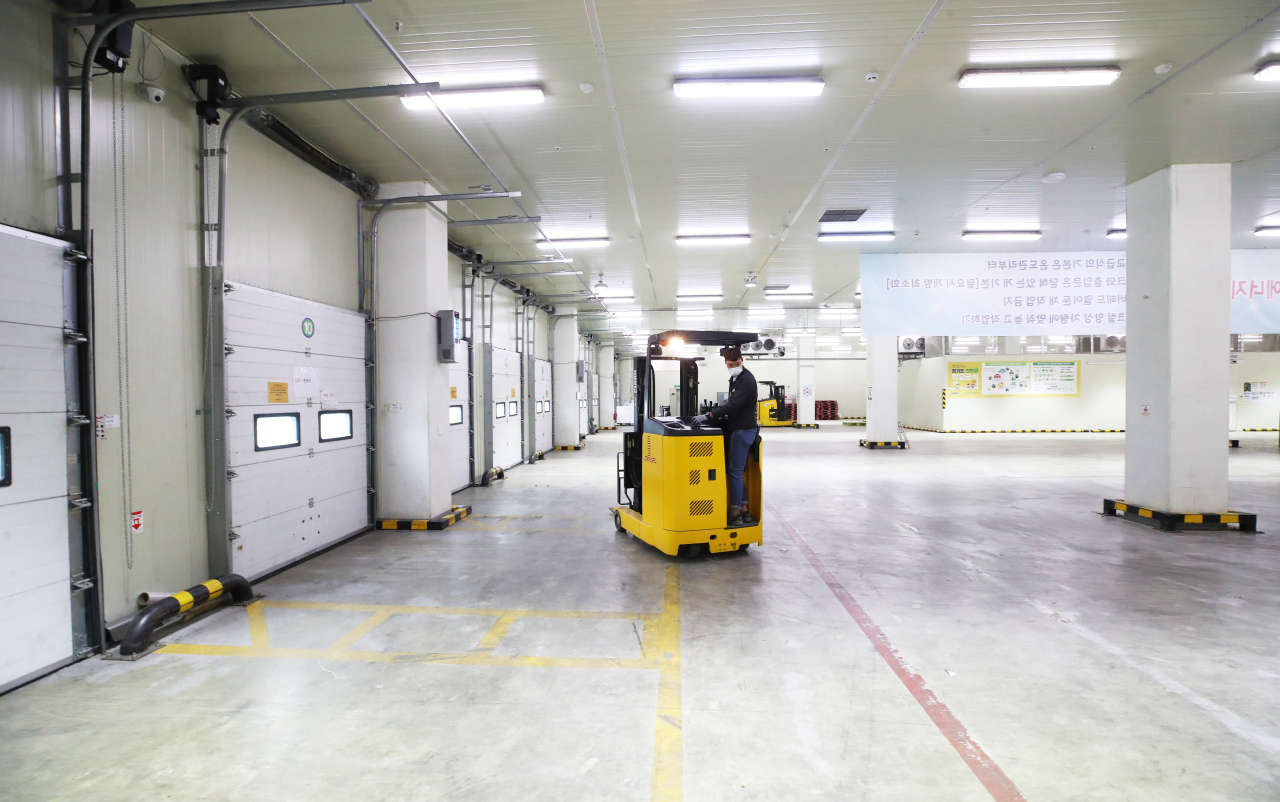
South Korea's central bank on Thursday again sharply lowered its growth outlook for the economy this year and froze its policy rate at a record low as uncertainties stemming from spiking virus cases heightened.
The Bank of Korea (BOK) forecast a 1.3 percent contraction for Asia's fourth-largest economy in 2020 amid the deepening virus fallout, sharper than its estimate in May of a 0.2 percent retreat.
"The recovery of domestic economic growth is likely to be slower than previously forecast, largely due to the domestic resurgence of COVID-19," the BOK said in a statement.
The country is struggling to contain the fast spread of the new coronavirus as the latest uptick in virus cases has spawned fears about a nationwide pandemic. BOK Gov. Lee Ju-yeol said the bank may further lower the growth projection, depending on how the pandemic unfolds.
The BOK said Asia's fourth-largest economy is expected to contract 2.2 percent this year in the worst scenario in which the flare-up in virus outbreaks continues into the winter.
As widely expected, the BOK's monetary policy board unanimously kept steady the base rate at 0.5 percent for the second straight occasion.
The BOK cut the policy rate to the record low in May after delivering an emergency rate cut of half a percentage point to 0.75 percent in March to cushion the impact of the new coronavirus outbreak. In July, the central bank also kept the rate at the current level. Gov. Lee said the central bank has room for further rate cuts but raised the need to be cautious about a rate policy change, hinting at a rate freeze for the time being.
"If the resurgence in COVID-19 brings a big shock to the real economy, the BOK needs to be active in managing monetary policy," Lee said at a press conference.
"The BOK has room for additional rate cuts. But as the base rate is at a low level, the bank should be prudent in deciding on a further rate cut after reviewing its impacts and side effects," he added.
The governor said the central bank's latest economic outlook is based on the current level of social distancing, Level 2.
South Korea's health authorities are considering raising anti-virus curbs to the highest level by one notch after taking into account this week's virus cases.
"If the social distancing guideline is raised to Level 3, the pace for economic recovery will be strained, thereby affecting the stock and currency markets," Lee said.
The bank said it will maintain its accommodative monetary policy stance as economic growth is expected to be sluggish and inflationary pressure will likely remain weak.
In the wake of the first wave of the virus outbreak, the South Korean economy showed some signs of recovery on eased slumps in exports and domestic consumption, backed by firm outbound shipments of key items, such as chips and massive fiscal spending.
But the recent spike in virus cases cast clouds on the Korean economy.
South Korea's new virus cases spiked to a near six-month high of 441 Thursday, with almost 4,000 new cases across the nation identified over the past two weeks.
Earlier this week, Gov. Lee told lawmakers that he does not rule out the possibility of the Korean economy contracting around 1 percent in 2020 and the pace for economic recovery will remain weak.
Asia's fourth-largest economy contracted 3.3 percent in the second quarter from three months earlier after shrinking 1.3 percent on-quarter in the January-March period.
The economy's second straight quarterly fall came as exports, which account for 50 percent of the Korean economy, tumbled amid global lockdowns caused by the virus outbreak.
South Korea's subdued inflation and still-high housing prices also appeared to warrant the BOK's rate freeze this month, experts said.
The country's consumer prices rose 0.3 percent in July from the previous year, marking the first upturn in three months. The BOK aims to keep inflation at 2 percent over the medium term.
Despite the government's measures to control rising home prices, the housing market has yet to be stabilized.
Household credit hit a record high of 1,637.3 trillion won ($1.38 trillion) in June on the back of banks' home-backed lending.
Experts said the BOK is expected to keep the policy rate steady throughout this year as it faces limited room for further rate cuts.
"Despite the pandemic-caused uncertainties, the policy rate is expected to be frozen for a considerable period of time due mainly to limited room for further cuts," said Kim Sun-tae, an economist at KB Kookmin Bank.
Gov. Lee earlier said the base rate has yet to reach the lower boundary but agreed this year's two rate reductions may have sent it much close to such a limit.
The BOK is expected to focus on non-conventional policy tools, such as state bond purchases, rather than rate cuts, in a bid to respond to the economic slump caused by the COVID-19 pandemic.
"Except for the rate policy, the BOK has other policy tools such as a special lending scheme and the open market operation," Gov. Lee said.
In May, the BOK launched a 10 trillion-won special lending program to allow banks, brokerages and insurers to take out loans from the central bank to help them fend of a possible funding squeeze amid the virus outbreak.
It marked the first time that excluding banks, the BOK has directly provided loans to brokerages and insurers. (Yonhap)







![[Graphic News] More Koreans say they plan long-distance trips this year](http://res.heraldm.com/phpwas/restmb_idxmake.php?idx=644&simg=/content/image/2024/04/17/20240417050828_0.gif&u=)
![[KH Explains] Hyundai's full hybrid edge to pay off amid slow transition to pure EVs](http://res.heraldm.com/phpwas/restmb_idxmake.php?idx=644&simg=/content/image/2024/04/18/20240418050645_0.jpg&u=20240419100350)






![[From the Scene] Monks, Buddhists hail return of remains of Buddhas](http://res.heraldm.com/phpwas/restmb_idxmake.php?idx=652&simg=/content/image/2024/04/19/20240419050617_0.jpg&u=20240419175937)

![[KH Explains] Hyundai's full hybrid edge to pay off amid slow transition to pure EVs](http://res.heraldm.com/phpwas/restmb_idxmake.php?idx=652&simg=/content/image/2024/04/18/20240418050645_0.jpg&u=20240419100350)

![[Today’s K-pop] Illit drops debut single remix](http://res.heraldm.com/phpwas/restmb_idxmake.php?idx=642&simg=/content/image/2024/04/19/20240419050612_0.jpg&u=)